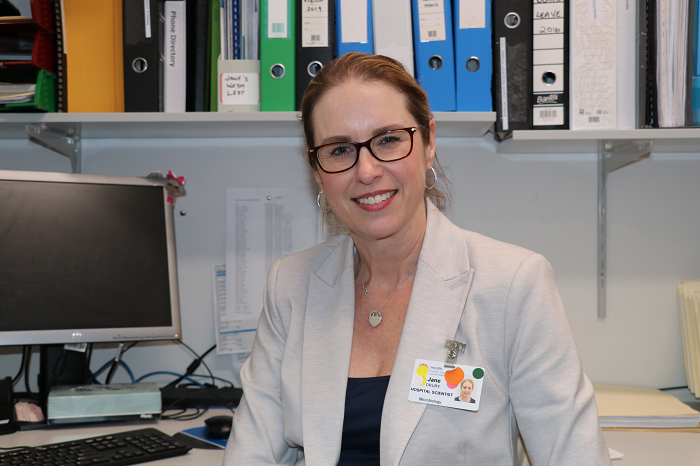
Microbiology Manager at John Hunter Hospital, Jane Drury and her team of scientists, are making sure our state is well-equipped to test for COVID-19.
Jane kindly stepped out of the lab to speak with us. Find out what she had to say.
What is your role at NSW Health?
I’m the manager of microbiology at John Hunter Hospital and have worked for NSW Health Pathology (NSWHP) for 22 years in various roles.
I started at John Hunter Hospital in 1998, as a trainee scientist in microbiology, then worked at Westmead Hospital from 2004-2008 in molecular microbiology. Now I’m back at John Hunter after re-joining in 2008 in microbiology. Newcastle is home for me – I was born and bred there.
How are you involved in the COVID-19 response?
My team and I have been responsible for assessing various testing methods for detecting the COVID virus. Working in our laboratory at John Hunter Hospital, we’ve been involved in assessing new pieces of equipment and testing kits to detect the virus.
We’ve put testing kits through their paces to make sure they are effective in detecting the virus. This was challenging at first, because when the situation reached pandemic status, we knew we had to respond quickly as more and more people needed to be tested. We needed a method that was fast and accurate.
Nose and throat swabs are taken from a person who suspects they may have COVID-19 and then laboratory staff process the sample to see if traces of the viral genetic material can be found.
What have you found challenging in your role?
COVID-19 is a new, or “novel” virus. This virus was completely different to anything we’d ever experienced before. Prior to COVID-19, we were used to working with viruses that were spread from person to person, but this virus came from animals and mutated to infect humans. This made our job challenging, as we were starting from scratch to work out testing methods that would allow people to be diagnose quickly and accurately.
We also didn’t prepare for a pandemic on top of our normal winter flu season - this made our work even more challenging.
Have you ever been involved in anything like this before?
I have worked on endemics including SARS and MERS and pandemics such as Swine Flu in 2009, but nothing of this magnitude - even in my time at the bioterrorism response unit at Westmead Hospital from 2004 to 2008, during the white powder era.
I was responsible then for testing samples of white powder on a weekly basis, but the difference now is, it never got to the point where I was asking myself regularly, “What’s today going to bring?”
I’ve never experienced anything like this before – not having control over my day. There are so many things that are out of my control and this is the most extreme experience in my career. I’m getting used to thinking on my feet and having to solve problems very quickly.
What has kept you going?
If it wasn’t for the team of people around me, we wouldn’t be able to achieve what we have and what we continue to achieve. I am humbled by the team’s dedication and work ethic.
People come up to me, even staff from other departments, and ask if I’m ok. They all care. I feel like this pandemic has brought out the best in many of us. People are stepping up to the challenge and still with a smile on their face. I’m humbled by their ability to get on with it and to come back again for more the next day, ready to expect the unexpected.
What’s your biggest learning to date?
One of my biggest realisations is that we all have an important role to play in responding to this pandemic. We’re all an integral cog in the wheel.
I see a positive attitude in my team and they surprise me every day. There’s not an hour in my shift that I don’t learn something new from everyone.
You have good insights into what’s happening with the pandemic. What do you tell family and friends when they ask?
Don’t panic and enjoy the chance not to do all of those errands! Seriously though, don’t panic - ask questions. I like to remind everyone that this virus was labelled “novel” for a reason. We are all part of a very steep learning curve and we need to be a little forgiving of the extra time we may need to take to solve all of the obstacles and issues we’re facing.
There’ll unfortunately be times we don’t get it right but being transparent, supportive and non-judgemental is the key.
What’s your message to colleagues across the system?
Look after each other. Everybody has a job to do and we all have days where we’d prefer not to keep going, but we need to try and stay as positive as possible. Everyone’s reacting differently to this situation, so listen and be supportive.
I’m hopeful we can take some of the positive practises from this experience and apply them during the flu season moving forward.
How do you unwind when you get a spare moment?
I like to get some exercise by taking my dog for a walk. I try to keep up my Pilates - via zoom - and having my children at home not doing so many extracurricular activities has allowed me to spend more time with helping them with their craft and LEGO – this is definitely not my forte though, but I’ve had fun doing it with them.
I am looking forward to when this is over. If I never have to talk via phone and zoom ever again I’ll be happy. I think I’m starting to develop callouses on my ears.
